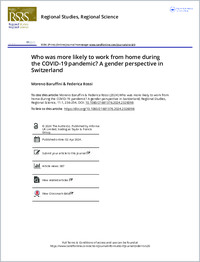Who was more likely to work from home during the COVID-19 pandemic? : a gender perspective in Switzerland
- Baruffini, Moreno ORCID Istituto di ricerche economiche (IRE), Facoltà di scienze economiche, Università della Svizzera italiana, Svizzera
- Rossi, Federica ORCID Dipartimento di Architettura e Studi Urbani (DAStU), Politecnico di Milano, Milano, Italia
- 2024
Published in:
- Regional Studies, Regional Science. - 2024, vol. 11, no. 1, p. 236-254
English
The COVID-19 pandemic has brought about a significant impact on people’s lives, both in terms of health and socioeconomic aspects. The pandemic has led to a shift in the work environment, with a massive increase in the number of people working from home due to movement restrictions. In this study, we analyse data from two waves (2019 and 2020) of the Swiss Labour Force Survey to investigate the prevalence of working from home in Switzerland before and during the pandemic. The study has two aims: to identify the characteristics of Swiss teleworkers during the pandemic and to determine if there is a gender gap in working from home. The findings reveal that highly educated workers with children in high-level occupations are more likely to telework. However, there is a gender gap in teleworking in some sectors, since part-time workers, who are mostly women (74 percent), are less likely to work from home than full-time workers.
- Collections
- Language
-
- English
- Classification
- Economics
- License
- Open access status
- gold
- Identifiers
-
- DOI 10.1080/21681376.2024.2326098
- ARK ark:/12658/srd1329964
- Persistent URL
- https://n2t.net/ark:/12658/srd1329964
Statistics
Document views: 101
File downloads:
- Baruffini_2024_Reg Studies_Who was more likely: 90
